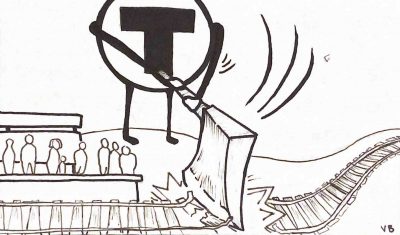The Massachusetts Bay Transportation Authority has proposed service cuts to the commuter rail, bus routes, subway and ferry. If these measures are approved by the MBTA’s oversight board in December, communities that rely on public transportation will be disproportionately impacted.
The commuter rail would have no weekend service, and six stops with low ridership would be closed. Subway service would run on reduced frequency and end at midnight. Bus routes — with low ridership or nearby transit alternatives — would be consolidated, and 25 routes would be entirely eliminated.

The MBTA has a budget gap that may surpass $575 million in the next few months depending on trends in ridership. However, a lot of change will take place during the start of the new year, which will affect the agency’s financial situation. Cutting down costs in such an extreme way seems short-sighted when help may be on the horizon.
The lack of access to public transportation goes beyond $10 weekend trips on the commuter rail and traversing Boston by bus. Some people take the commuter rail or train because they don’t want to pay for parking, and others take it because they don’t have a car — polar opposite situations.
The effects of gentrification will worsen because people who come into the city for work, and rely on public transit to do so, may not have full access to transportation or will be severely inconvenienced when trying to do so. They will only be pushed farther from this community.
So, the difference between cutting the commuter rail on the weekend and 25 bus routes during the week is actually substantial. Financial livelihoods are on the line.
Additionally, the people operating these trains, buses and ferries will be out of work if their route gets cut, which will further raise the unemployment rate that had begun to recover since its spike in April.
The problems people are already facing are going to be compounded, and certain communities will inadvertently be targeted by these service cuts — demonstrating a lack of sympathy from the MBTA.
Even if certain communities have low ridership, their need for access to transportation should be valued just as much as any other resident in the Commonwealth.
The MBTA has historically struggled with delegating its funds to the proper resources, so its long-term budget has suffered. In emergencies such as these, the MBTA should have the money to cushion unexpected costs.
These decisions are never easy to make. When committees are crafting budgets and proposing cutbacks, they are focused on staying afloat. Money becomes the priority, so someone — or some group — will always be overlooked. The current proposed solution is also better than completely shutting down the MBTA, which would have a devastating impact on the community.
However, the MBTA can still manage better use of its resources to lower the inconvenience for those who rely on public transportation.
It could repurpose buses to replace the lines cut, and these could run at a lower frequency rather than not at all. When lines are cut, the MBTA must ensure riders have other alternatives.
Less access to public transportation — along with the currently limited capacity allowed on each ride — means more people will be walking and waiting for rides. Some may not catch a ride at all, and will be forced to either find new work or go without a paycheck. But either way, our community will be left in the cold while the MBTA tries to get its budget together.
If we continue to overlook our community’s needs, the barriers of wealth inequality and gentrification will only worsen in a time when we cannot afford them to.





















































































































